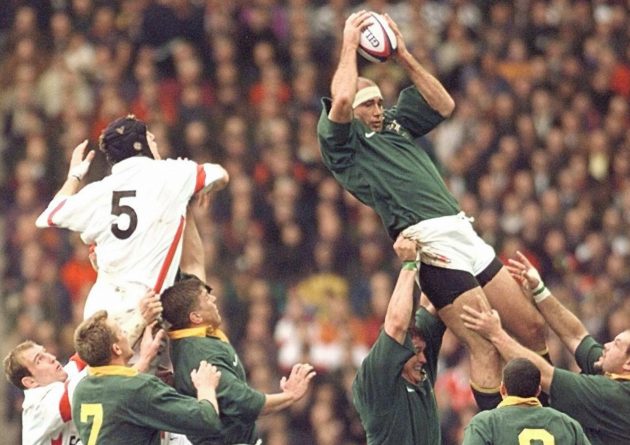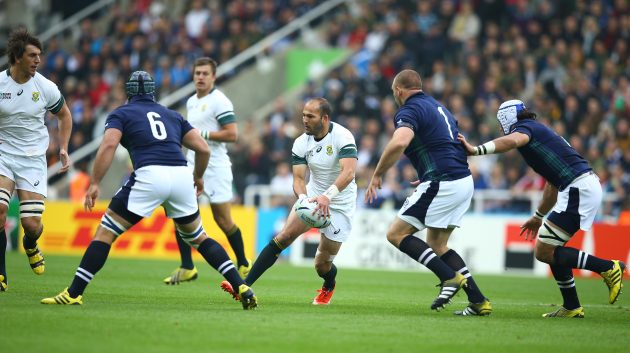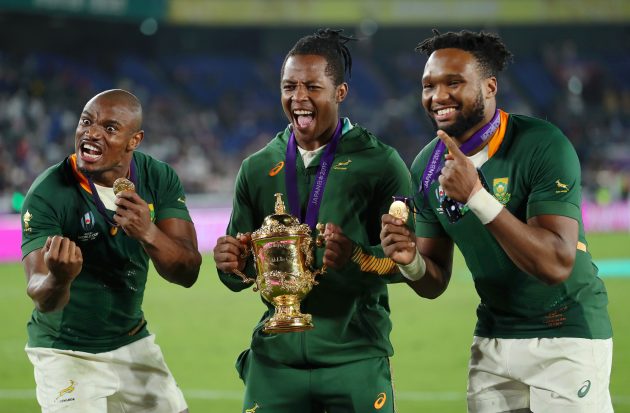The shortlists for the Telegraph Sports Book Awards were announced this week. A recent book celebrating and chastising South African rugby is among those to feature
Our Blood is Green – the Springboks in their own words
When it comes to South African rugby, what happens on the pitch is the easy bit. Of the field, the condundrums and complexities have piled sky-high.
Racial prejudice and quotas. Provincialism. Pay inequality. Just some of the huge issues that have shaped the game in the republic since they were readmitted to the international fold.
Our Blood Is Green, written by Gavin Rich and published by Polaris, came out last autumn and gives a voice to more than 40 Springboks of current or recent vintage. Much of what they say is fascinating and thought-provoking.

The pay issues derive from the deal that Francois Pienaar did with Louis Luyt that scuppered Kerry Packer’s plans for the breakaway World Rugby Corporation. The 1995 World Cup-winning players got fat contracts but that left little in the pot for everyone else. For example, hooker John Allan started many of the 1996 Tests but replacement James Dalton was being paid four times as much.
Top for mouth-agape shock value is a tale from Mark Andrews, one of those 1995 world champions, that occurred shortly before the 1999 World Cup. The wild pay discrepancies still existed then, with some players being paid only for appearances.
The players discussed what they wanted in a meeting chaired by Andrews and skipper Joost van der Westhuizen. The latter and Bob Skinstad were tasked with negotiating with management. The most important demand was a guarantee of R45,000 for the lowest type of contract, so that every player would be assured of some income.

Taking a lead: Springbok lock Mark Andrews wins lineout ball against England in 1997 (AFP/Getty Images)
Off they went and the next day the team sat down to be told by management what they would all be getting. The answer? Six A-contracts worth R1.2m a year, eight B-contracts worth R650,000 a year and a R25,000 Test-match fee for the rest.
“All the guys’ mouths were hanging open,” says Andrews, the main driver behind seeking a fair deal for all. “They were all looking at me. Everyone was too scared to talk.” Andrews protested to management, things got a bit heated, that day’s training was cancelled.
Later that day, at 10.30pm, van der Westhuizen knocked on Andrews’s door and burst into tears. He admitted he had been promised a R1m bonus (on top of his A-contract) if he could persuade the players to accept the new pay structure.
Andrews told Joost that he had lost the team, he had put himself before the players. “I have never spoken about this before,” Andrews writes, “but it has been on my chest, and I can speak about it now because Joost is no longer with us.” Tragically, van der Westhuizen died in 2017 of MND but he said the disease had made him a better person.
The players eventually got what they wanted but Andrews became persona non grata with the management and SARFU. The only players he recalls thanking him for sticking up for the team were Ruben Kruger and Brendan Venter.

Pushing in the same direction: the Springboks scrum down in the first Test against the 2021 Lions (Inpho)
James Small is another contributor to the book. The World Cup-winning wing had toyed with the idea of writing his own book so he could talk about “all the English-speaking guys who got shafted by Afrikaners who felt they owned the game”. He adds: “To the Afrikaners, back in those days, we were just souties. We were seen as different and made to know it.”
When Kitch Christie was Springboks coach, there was a rule that you had to have a two-thirds majority for something to happen. Two-thirds of the squad were Transvaal players.
Small says he was regularly bliksemed [beaten] at Transvaal and for his Springbok initiation was smacked 79 times on one bum cheek. His leg was discoloured all the way down to his calf. “Most of it came from Naas [Botha]. He was bombastic and arrogant in those days. As the captain of the team, he thought he owned the world.” Today’s Boks are spared such ordeals.
Small died from a heart attack before Our Blood Is Green went to press. The author decided to publish his contribution because Small seemed so keen for his views to be heard.
? It's all square in the #CastleLionsSeries – one game to go! #StrongerTogether #StrongerForever pic.twitter.com/oP6wxM6Gbj
— Springboks (@Springboks) July 31, 2021
Skipping forward, Fourie du Preez is a world champion of the pro era, steering the team that triumphed in 2007. In 2004, the year of his Test debut, he was picked to play against New Zealand. Later in the week, there was a sudden U-turn – Bolla Conradie would now be starting and du Preez would be on the bench.
Du Preez had just become a victim of the country’s transformation policies, which affected Jake White’s time as national coach more than most. Head office ordered White to pick more black players. It’s an issue that divides opinion. Current Boks captain Siya Kolisi has said he wouldn’t want to be picked because of his skin colour and that Nelson Mandela would never have supported transformation targets in national teams.

Fourie du Preez at RWC 2015, which brought him even more satisfaction than the 2007 triumph (Getty)
Du Preez takes a different tack. “I grew up with the reality that certain players had to be in the team and it never bothered me. I wanted to play for South Africa, and transformation is part of South Africa. But I did have a problem with the way Jake handled it.”
Ollie le Roux, who won 54 caps at prop, has a different solution to the transformation problem. Award ten bursaries to talented kids from disadvantaged communities near a top school. Ten kids a year for 30 schools would be 300 kids a year being exposed to the best coaching and high-performance facilities that the schools system has to offer.
There are weighty concerns about schools rugby in general. “Schools rugby has become too serious and win-at-all-costs, and we risk losing a lot of talented players who will be burnt out by the time they finish matric,” says former wing Stefan Terblanche, who won 37 caps. “If they don’t immediately get a professional contract, they give up on the game.”
Victor Matfield, South Africa’s most-capped player, says 90% of kids in the country throw their lives away chasing a dream that doesn’t happen.
In a chapter called Are the Lunatics Running the Asylum?, Fourie du Preez is scathing about the failure of bosses to tap into the knowledge of legends like Matfield and Schalk Burger, men who have played in multiple World Cups and experienced everything in the game.
“Coach X in this country thinks he knows everything and as a result he learns nothing,” he says. “I went to Japan and I learnt more there in my first year than I ever did at home.

Victor Matfield and Schalk Burger, 213 Test caps between them (Gallo Images)
“For me as a player, the most frustrating thing was that I knew exactly what the head coach’s plan was, and then I’d go into a session with the back-line coach and he’d be talking a load of s**t. Then I had to worry about the players next to me because we were getting two different messages. That sort of thing happened with most of the teams I played for in South Africa.”
A strong message from the book, conveyed by many of the interviewees, is that South Africa has a massive coaching problem. Coaches are too scared to progress. The better players go abroad, partly because of the poor coaching at home and partly because they can earn much more money in Europe or Japan. The player drain means too many average players are getting paid in South Africa. It’s all hurting the country.
These are some of the big issues discussed. There are many others – the book has 27 chapters – and not all entail division and controversy. The Road Less Travelled explores how players made it in the game. Breyton Paulse’s big opportunity came when the farmer who employed his mother paid for him to study at Stellenbosch – “That was where I got my ticket to life”.

Life turned upside-down: Breyton Paulse celebrates a 2005 try v Australia in spectacular fashion (Getty)
Charl Marais, a farmer’s son, turned up at Grey College in Bloemfontein as a fly-half. Everyone had to write down their position and their previous best team on a board. The only position that no one had played in at Craven Week was tighthead prop, so he wrote that down and went on to win 11 Springbok caps as a front-rower.
And of course there is the story of Kolisi, who as a kid growing up in Zwide would go to bed worrying if he was going to eat tomorrow. His grandma would visit friends in the township and return with a slice of bread and butter that would sometimes be his only meal of the day.
At his school there were ten teams and when one team finished playing, the players would peel off their sweaty jerseys to hand on to those in the next team to play. Kolisi was 12 years old then and vowed that if he ever made it in rugby, he would buy each team their own set of kit. Three years ago he did just that and he says it’s one of his proudest moments.

Siya Kolisi tackles Courtney Lawes during the current South Africa-Lions series in Cape Town (Inpho)
It would be easy to go on because there is so much good content in Our Blood Is Green. But let’s finish with a tale from John Smit, who along with Jake White is credited with stamping out all the unedifying provincial conflict and for whom there is a lot of love in the book.
The man who led the Boks to World Cup glory in 2007 and victory over the Lions two years later tells a story about Bakkies Botha, the second-row renowned for his uncompromising play. It has a certain topicality in light of Duhan van der Merwe, the South African-born wing who qualified for Scotland and is currently taking on the Boks for the Lions.
Related: Lions 2021 Latest News
“Bakkies’ biggest fault – or his biggest asset – was that he had a very loose understanding of the laws of the game,” starts Smit. “The best example of this was when we played England in 2007 just before the World Cup and came up against Matt Stevens in the front row – a player born and brought up in South Africa who moved to England and qualified to play for them.
“And Bakkies couldn’t understand that. Why would a guy born on South African soil play for the Queen? He just couldn’t get it. I tried to explain to him about ancestry and residency rules and all that, but he was still mystified by it all.

John Smit and Bakkies Botha after winning the 2009 Tri-Nations in Waikato (Gallo Images/Getty)
“Anyway, we were playing England in Pretoria and in the first scrum, Bakkies packs down behind me on the loosehead side, which wasn’t his position – he was always a tighthead lock. But he knew that if he packed down there and didn’t bind with his right arm, he’d have his right fist free to swing a punch through on the front-row opposite.
“So the first scrum goes down and he zaps a perfect shot through and splits Matt Stevens’s eye. The poor guy had to go off and get 14 stitches.
“Seven minutes later, Matt comes back on and I’m thinking, ‘It’s okay, Bakkies has got this out of his system, it won’t happen again’. But at the next scrum I’m a little nervous and push my head to the right just in case because I don’t want to get smacked by Bakkies by mistake.

Matt Stevens is treated during the match (Getty)
“But I should never have doubted him because he hit Stevens on the exact same spot, bursting all 14 stitches on his eye. So Matt goes off again and thankfully the half-time whistle goes and we get a chance to calm everything down.
“We start the second half and a few minutes in, we pack down for another scrum – and I notice Bakkies is back on the loosehead side again. Oh Jesus. I look down and think, ‘Right, this is now my time to lead from the front and take a stand’. So I say in Afrikaans – so the referee can’t understand – ‘I think that’s enough.’
“Bakkies has his left arm bound on his prop and he looks up at me like a little schoolboy and says, ‘Just one more, please Cappie’.”
Our Blood Is Green by Gavin Rich is published by Polaris, RRP £17.99. It’s highly recommended.
We have six copies of the book to give away – enter our competition for your chance to win a copy of Our Blood Is Green.
Download the digital edition of Rugby World straight to your tablet. Subscribe to the print edition for magazine delivery to your door.
Follow Rugby World on Facebook, Twitter and Instagram.





